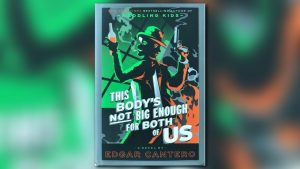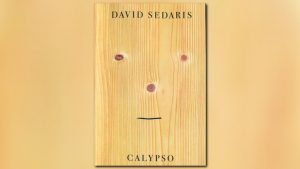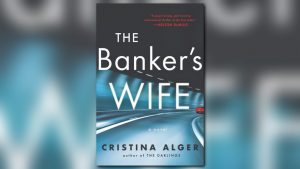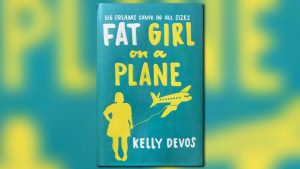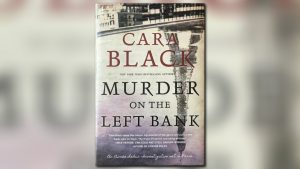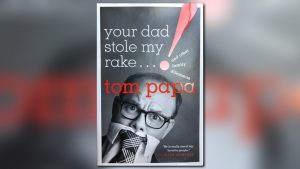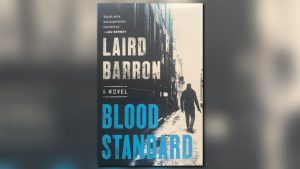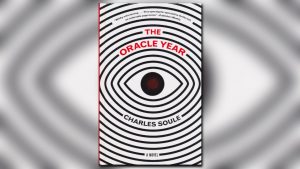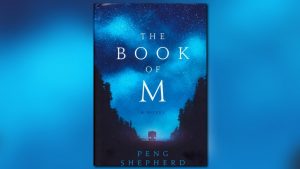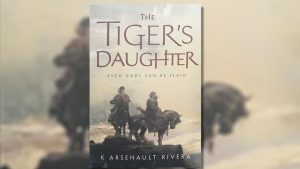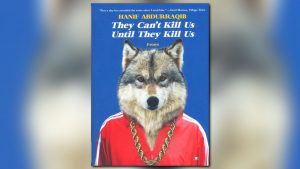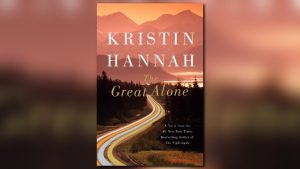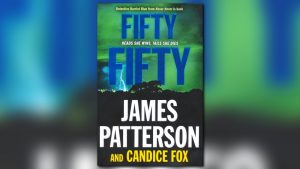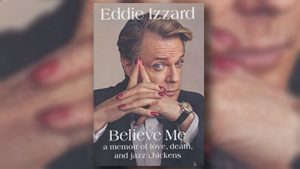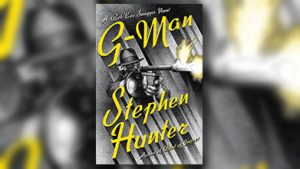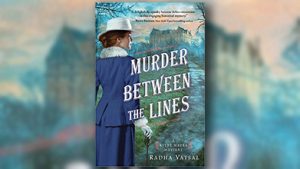Jennifer McMahon’s “The Winter People” takes place in West Hall, Vermont.
In 1908, Sara Harrison Shea was found dead in the field behind her house just months after the death of her daughter, Gertie.
In present day, 19-year-old Ruthie lives in Sara’s old house with her mother and younger sister.
Her mother always wanted to live outside the norm and one morning Ruthie wakes up to find that her mother had vanished without a trace.
She finds an old diary of Sara Harrison Shea hidden in her mother’s bedroom.
Ruthie soon realizes that she is not the only person who is looking for someone they have lost, but she might be the only one who can stop history from repeating itself.
VOICEOVER: Books and company is made possible by the Virginia G. Piper center for creative
writing, serving writers and readers in the Phoenix metropolitan area, the State of Arizona, and
the world.
ALBERTO RIOS: Welcome to books and company. I'm your host, Alberto Rios. We're joined
today by Jennifer McMahon, who will be talking about her most recent book, "The Winter
People," published by Double Day. Welcome, Jennifer.
JENNIFER MCMAHON: Thank you very much for having me.
ALBERTO RIOS: This is exciting. I know this is going to be a popular book. It's got popular
written all over it. Maybe we can start with a little synopsis of the book without giving too much
away.
JENNIFER MCMAHON: Sure. "The Winter People" begins in 1908 in the town of west hall,
Vermont, and we learned that Sarah Harrison Shea, a farm wife, is found brutally murdered in
the field behind her house, and this is only weeks after the death of her beloved girl, girdy, and as
we get into the book, and we look at her diaries and found she found a way to bring her back.
And in the present day we have Ruthy washburn living in the old farmhouse with her sister,
Fawn, and they wake up to find their mother has disappeared without a trace, and they start
searching through the house looking for clues trying to figure out what might have happened to
their mother, and they discover Sarah's diary and, and the more they look into it, they start to
realize their mother's disappearance had something to do with Sarah and a terrifying secret over
100 years old.
ALBERTO RIOS: Ok, well. Off we go. A lot of characters. And when you say diary, it's really
multiple diaries. And you position us at different points in time. We start out in 1908. We are
time travelers, as readers and as the text transports us.
JENNIFER MCMAHON: Yeah. We have got -- 1908, we have Sarah's diary, and I tell part of
the story from the point of view of Sarah's husband, Martin, so we go, and we're following along
both those, both from, from the protagonists, and we come forward to the present day and, and
we have got Ruthy's story, and then we also have the story of Catherine, who recently, an artist
who came to town after losing her husband in a car accident, and she has been drawn to west hall
because for some reason, she does not understand it all, her husband spent the last day of his life
in west hall and was killed in a car accident on the way home. He had told her that he would be
in the Boston area, he was a photographer, and he was going to shoot a wedding in Cambridge,
for some reason he lied to her about, about how he spent his last day alive. She has come to town
to figure out what's going on.
ALBERTO RIOS: All very mysterious.
JENNIFER MCMAHON: All mysterious.
ALBERTO RIOS: Which we know, all the mysteries get answered, but how we come to those
answers is, of course, complex and ought to be.
ALBERTO RIOS: You structured this book in many ways. I was -- it's, it's, by no means, an easy
comparison, but, something like Dracula where you bring in diaries, media, and other, other
kinds of attentions that, that sort of help to tell the story. It's not a voice, necessarily. Multiple
voices often through diary form.
JENNIFER MCMAHON: I see it as like being a collage, and just taking the pieces and layering
the Pas and present together and doing it through the diaries, and through lesser, and through,
through, you know, the present day storylines, and layering all that together.
ALBERTO RIOS: So, it does not all have to be in neon or yelled. It whispers.
JENNIFER MCMAHON: Whispers, yes, yes, and actually, part of my process is, is once I do a
really messy, crazy first draft, I take the book, which is then a long rambling thing. I'm not sure
what the true story is once I have my first rough draft, and I lay it out over the floor of my house,
and I move chapters around and walk around it, and then it very much is like a collage. I am
pulling sections out and moving them from place to place and seeing what's missing, and that's
when I get the first true idea of what the story really is, and what's going on and, and then I will
go and make my outline from there.
ALBERTO RIOS: And it sounds like you approached this with no fear? You have a, a, a
narrative in mind but you are not afraid to, to tear it up a little?
JENNIFER MCMAHON: No fear. Usually, when I'm about, about halfway through a book, I
think what am I doing? I'm not going to be able to pull this all. It does not make any sense. "The
Winter People" I had Catherine's storyline, and I had no idea why her husband had come to West
Hall at first or what she was doing there, and I had to keep writing to find out. So it's very much
a process of discovery for me, as I go along, and that's what makes it fun and exciting.
ALBERTO RIOS: When we get that gift from the text, from the story, it starts to, to, to go into
that.
ALBERTO RIOS: In this, I'm going to bring up the thing that I think is at the core of this, and
it's, it's -- whatever versions of word we want to use, but it's about resurrection. And so, there is,
there is -- you mentioned early on, it's about bringing or the potential for, for bringing somebody
back to life who has passed on, and maybe we're going to call them winter people, which that
might not be how you meant that there. We have got the other word, sleepers, and all in this, in
the states of, of living or not living, and historically, I mean, this is, this has been at the core of,
of human frailty, seances, that desire to bring somebody back,and how do you begin to enter
that?
JENNIFER MCMAHON: The question at the heart of the book is, if you lost someone you love,
you know, how far would you go to bring them back and to see them again? Would you do it no
matter the consequences? That's a question I ask myself over and over as I was writing the book,
and when I first started, when, when I first came up with the character of Sarah, I thought that
she would be a spiritualist at the turn of the century, and I was going to have her lose a daughter
and believe that she could communicate with her through rapping on tables and seances, and then
this wonderful thing happened, and one of those magical writing moments that happens
sometimes, and I was writing a journal from Sarah's point of view, and I wrote those all out how
I got in touch with Sarah, I feel like.
ALBERTO RIOS: No computer in that.
JENNIFER MCMAHON: No, no, I was, you know, and it was funny because I was -- I was
reading about spiritualism and spirit writing. And sometimes I think about that when I was
writing Sarah's journal entries. One day I got this line, the first time I saw sleeper, I was nine,
and I went wow! And I got chills, and I thought, that's a sleeper? And, and --
ALBERTO RIOS: The word just came?
JENNIFER MCMAHON: It just came, and there it was on the page, and I wasn't sure that I
wanted to find out because it sounded really crazy, but of course, I had to find out so I had to
keep writing to find out. And --
ALBERTO RIOS: It's a great word.
JENNIFER MCMAHON: It is.
ALBERTO RIOS: And it's a perfect work for what happens in the book. I think that, that, that --
sleepers, I don't know if that's a benign word. It says something about death, that there is -- and I
don't know, I mean, we want to believe it -- there is a chance.
JENNIFER MCMAHON: There is a chance, and Sarah certainly believed it, you know, as we
read her diaries. She comes to believe that it is really possible to bring someone back and, and
yeah.
ALBERTO RIOS: Well, the book, the narrative is, as we said before, it goes back and forth in
time. How did you keep track of that for one thing. Just pragmatically?
JENNIFER MCMAHON: It was not easy, and I didn't write all of the back story first, and then
the present story. I went back and forth as I was writing it, and it was, you know, as I said, when
I read the first draft, it's a long mess of a thing, and it didn't necessarily go in chronological
order, and it was kind of a mess. It was very much, when I, after I laid it out on the floor, and I
did my outline, I think that that's when I really started making the timelines and made sure that
everything lined up, and I had charts and timelines and drew maps of the town and of the, of the
farmhouse in the area and the devil's hand, which is this formation of rocks up on the hill behind
her farmhouse and, and --
ALBERTO RIOS: You drew them out?
JENNIFER MCMAHON: I drew them out.
ALBERTO RIOS: You wrote out text and drew out and started to create this world.
JENNIFER MCMAHON: I definitely created the world, and I knew where -- and I had the map
of the town and the, in the present day and the map of the town in 1908 and the things that were
the same and changed, and I had a lot of fun playing with that and visiting the same scenes.
ALBERTO RIOS: Was this based on a place? Or you made it?
JENNIFER MCMAHON: It was not based on a specific place. I did a lot of reading and
historical research, and I spent a lot of time looking at maps from that time period of towns
serving in the central Vermont area and how they changed. And I had based it on -- it was
completely invented, but, based on some towns, some local towns.
ALBERTO RIOS: As I was saying to you before the interview started, when I was in Vermont
myself, forest has a real presence.
JENNIFER MCMAHON: Yeah.
ALBERTO RIOS: And it has a presence beyond itself. That mist, that just extends, you know,
five feet farther than the last tree. It feels like the, the -- there is an entity breathing.
JENNIFER MCMAHON: It does, yes. Almost like the force is alive and reaching out for you. I
spent a lot of time walking in the woods, you know, I try to get into the woods every day if I can,
and I just find such inspiration. I am an easily frightened person, so if I go -- I scare myself all
the time.
ALBERTO RIOS: And you are going into the forest.
JENNIFER MCMAHON: I am going into the forest, and if I go in and it's dark and I'm by
myself and it's winter and the sounds are more loud and kind of haunting sounds, and I feel like
it's -- it's quieter in the winter, especially if there is fresh snow and, and yeah. So, you hear
strange rustling sounds, and my mind goes to all kinds of things, what is that? It can't be a bird,
really, maybe it's something else, you know. Are those footsteps that I hear behind me?
ALBERTO RIOS: Exactly. Which then begs the question, this is what I was leading towards,
could this happen in Arizona? It seems that geography or the place is so important to the
vibrancy or whatever way you want us to feel, that, that maybe it has to happen there. What do
you think, as a writer, what do you think?
JENNIFER MCMAHON: I feel like, you know, the way that I told the story, my interpretation, it
had to happen in Vermont because I feel like the landscape is such a part of the story, and the
setting, and the winter and the deep snow and the miserable cold and, and the way that the snow,
you know, plows the trees down, and I just -- I feel like that needed to happen.
ALBERTO RIOS: No cactus?
JENNIFER MCMAHON: No cactus. That was really difficult. That would have been a, an
interesting book.
ALBERTO RIOS: But very different. Very Different.
ALBERTO RIOS: Tone, then, sort of springs from that. We have a serious landscape, not that
others are not serious, but we have a, a, a foreboding landscape.
JENNIFER MCMAHON: Yes.
ALBERTO RIOS: And in all of its time period.
JENNIFER MCMAHON: Sure.
ALBERTO RIOS: Which, which gives us then a sense of, of tone. You were describing it as
quiet-tude, and the snow making the trees bow over and so on. That gives us something that we
feel that's tangible, palpable.
JENNIFER MCMAHON: It's almost kind of like a haunting landscape, and I thought while I
was writing "The Winter People," how hard winter is for me, and I tried to imagine how hard it
must have been in 1908, you know, without electricity and central heating and Patagonia fleeces.
ALBERTO RIOS: How did they survive in 1908?
JENNIFER MCMAHON: It was tough, you know. It was hard. They had their wood stove and
their coal stoves, and they bundled up, and it was a lot different. They didn't have snowplows,
they rolled it with rollers and had a team of horses. A whole different world. It must have been
much harder.
ALBERTO RIOS: Fewer people with good reason.
JENNIFER MCMAHON: Fewer people. Yes.
JENNIFER MCMAHON: Shorter life-spans.
ALBERTO RIOS: That tone, then, asks of us, as readers, for that thing that, that we, we like to
call a willing suspension of disbelief. We have to go in there with you, but we may not want to.
We're like you. We're, we're scared.
JENNIFER MCMAHON: I was not sure that I wanted to.
ALBERTO RIOS: How do you entice, as a writer, how do you entice a reader into a place you
don't think that they want to go?
JENNIFER MCMAHON: By giving them characters to care about, and if the character goes
down that road, you want to go with them. That's what happened for me as I'm writing the story,
if I'm attached to this character and loving the character and invested in the character, I will
follow her. You know. I'm going to follow her down that road and follow her as she attempts to
bring her daughter back from the dead, and see what happens, and I'm not an outliner so I never
know what's going to happen next, so I am following along, so it is a big, an act of discovery for
me, as I go along.
ALBERTO RIOS: You, too.
ALBERTO RIOS: I would like to take a moment to remind our viewers you are watching books
and company, I'm your host, Alberto Rios. We're joined today by Jennifer McMahon, talking
about her most recent book "The Winter People." And not just the book, we're talking about the
characters who are the winter people. Who do you find, or who do you define the winter people
as? Is it, is it -- I don't want to make it, a dichotomy between making a living and not so living
but who are the winter people?
JENNIFER MCMAHON: The Winter People, the title came from a line in the book where the,
where the girl, girdy in 1908 is talking to her mother about people stuck between this world and
the other world, and they are in between. She calls the people winter people.
ALBERTO RIOS: Would that be the same as the sleepers?
JENNIFER MCMAHON: Some sleepers could be winter people, but, you know, it wasn't an
intentional thing, and I had that line way before I came up with the sleeper concept.
ALBERTO RIOS: Ok.
JENNIFER MCMAHON: And then at the end -- well, I don't want to give away too much about
the ending.
ALBERTO RIOS: Right. I did find it interesting to sort of parse through what the difference was
between straightforward winter people, because it, it includes the people who are very much
alive, who are simply in winter. I mean, that is a real thing, as we've been describing, and yet
there is a metaphorical thing that work throughout the book, and I think that they all come into
play.
JENNIFER MCMAHON: Yeah, it's my sixth book but the first one that I set in the winter, and I
just had so much fun. I had so much fun with it, and I spent a lot of time outside, and I went
snowshoeing, and there are scenes in the book where they are snowshoeing. And I had not done
that in years so I spent time snowshoeing to get a feel for it and get the details right of what that
was like.
ALBERTO RIOS: I am, I have a curious question for you now, as a reader. The doll Mimi, I
wanted that doll! Something happened to that doll. Sometimes a doll is just a doll.
JENNIFER MCMAHON: Sometimes a doll is just a doll, and I was wondering if something was
going to happen with that doll, but she proved to be just a doll in the end.
ALBERTO RIOS: Which is interesting because coming into it, and reading through it, if I feel
that sense of ominous presence, I am seeing it everywhere, including that, so it's almost an equal
surprise by the end, but it doesn't come out of this place or that person or this, this thing like a
doll.
JENNIFER MCMAHON: Yeah.
ALBERTO RIOS: So, is there, is there an opposite effect? Were, where the surprise is not
always the high drama of revelation or whatever happens in the end? But the things that maybe
don't happen?
JENNIFER MCMAHON: I haven't thought of that before, but that's a nice thing. I think so.
ALBERTO RIOS: And mimi is a good example.
JENNIFER MCMAHON: Mimi is a good example
ALBERTO RIOS: And I am waiting and I am waiting, and that is not --
JENNIFER MCMAHON: She's just a doll.
ALBERTO RIOS: Ok.
ALBERTO RIOS: I hope we are not giving anything away.
JENNIFER MCMAHON: A very imaginative girl, and the girl, fawn, talks to her and they have
conversations, and you wonder what's going on with the doll. I wondered while I was writing,
wondering if there was another voice speaking through me.
ALBERTO RIOS: As readers, that's what we are thinking. It's not that it's a red herring exactly,
but it's a bit of one.
JENNIFER MCMAHON: Right.
ALBERTO RIOS: You are making us look there like a good magician.
JENNIFER MCMAHON: Right.
ALBERTO RIOS: Look at the doll.
JENNIFER MCMAHON: Yeah.It's just another thing that's there. It's there through the collage.
ALBERTO RIOS: That's true.
ALBERTO RIOS: One of the things that, that we get, also, throughout, and I enjoyed this a lot
because I think that, that the story is, is largely built on this, is just maybe the simple idea of
secrets. Now, they are, they are rife throughout the text in all sorts of ways. There is the secret
passages, and there are multiple ones. The secret holes, the hiding places. Just plain secrets that
people keep from each other. How did that, that play out for you? Where did you come up with
this? Maybe we could go through a few of those different ones.
JENNIFER MCMAHON: Yeah. I think that the secrets are a really important part of the book.
The secrets like you were speaking of and the secrets that everyone in the book is keeping some
sort of secret. I feel like, and you know, and when I'm getting to know a character, first
developing them and, and going on, with them, one of the questions that I ask when I'm starting
to do my, my, starting to figure them out, what's the one thing you have never told anyone? I do
a free writing exercise, and that gives me insight into how all the characters have secrets.
ALBERTO RIOS: I like it. And, and the secrets, we have these, these -- it's a great device, a
writerly device, to have secret hiding places because then you can allow information to come
into the story.
JENNIFER MCMAHON: Yep.
ALBERTO RIOS: Later.
JENNIFER MCMAHON: Yeah.
JENNIFER MCMAHON: I had fun with in that, and who does not love secrets and discovering
there is a secret hiding place in your house, and thought that you knew the ins and outs and you
discover that there is not only a secret hiding place but something in it.
ALBERTO RIOS: Something in it. And what I really liked about it, from the point of view of a
writer, is that you get to add to the text in rich ways, what we find in there, they matter, but, you
help us not get it all at once by virtue of these things being hidden. So, it's not that we're on a --
we're not on a wild goose chase. What is the thing when you are looking for something.
Whatever those are called.
JENNIFER MCMAHON: A scavenger hunt!
ALBERTO RIOS: A scavenger hunt were these things, simply, evolve and, and are organic to, to
the explorations of the house, or the characters. And, and they, they are germane. They, they
make sense, and they matter when they are found.
JENNIFER MCMAHON: Yeah, and then at the end, when everything is wrapped up, you go ah,
and hopefully, it all makes sense why we found those things when we did.
ALBERTO RIOS: Yeah. Did you experiment with putting those out of order?
JENNIFER MCMAHON: I did. When the two girls find the journal and, and, and in my first one
they found a bunch of things in that first hiding spot. And it did not make -- money and all kinds
of things that did not make a lot of sense and did not make it to the final cut. And I had scenes
where they found other things, and other secret hiding places, but I thought maybe that's a bit
much if they discover more secret hiding places and more and more things.
ALBERTO RIOS: It made sense the way you told it, and that, I think, ended up adding well
together.
JENNIFER MCMAHON: Right.
ALBERTO RIOS: And, and we, we -- that's why we need to be careful to say secrets. There is
not one secret. This is not a one-trick pony, let's say.
JENNIFER MCMAHON: No.It's true.
ALBERTO RIOS: There are multiple secrets and, and I like that idea. What I'm, when I was
thinking about this, I just wonder if that's a part of New England, itself. This idea of, of, of the
economy, you know, you just hide things in places or you put them somewhere, and they need to
be out of the way. You cannot -- you might be sitting on them, and I don't know.
JENNIFER MCMAHON: It could be.
JENNIFER MCMAHON: I don't know.
ALBERTO RIOS: Ok.
JENNIFER MCMAHON: I don't know, either, but, it could be. I remember as a kid, I don't know
if I had seen a TV show, or, or a movie. About, about a boy who discovered a secret hiding place
in the wall, and he finds all these treasures in it, and you know, I went around, and I was
knocking, and I went up into the attic and broke down one of the walls that I was sure that there
was a secret room, and my grandmother came up and said 'what on Earth are you doing?'
ALBERTO RIOS: Well, you know, if you had explained it to her she probably had done the
same thing, once upon a time in her life, right. Right. That's one of the things that you play with
here is, is generations.
JENNIFER MCMAHON: Yeah.
ALBERTO RIOS: And that we, we repeat certain actions, and we have similar desires. We have
this, this desire to bring somebody who has passed away back. I don't think that changes.
JENNIFER MCMAHON: And grief stays the same.
ALBERTO RIOS: And those things, it's not that they are constants. They change according to
each person, but, they are constants in the big, big picture, I think.
JENNIFER MCMAHON: When Sarah goes through, losing girdy, her grief is something that, I
think, any parent can relate to, how devastating it is, no matter who you are. Even though she
lived in 1908.
>> Well, now that you have written a book like this, and it's based on secrets, and it's based on
places. We have the forests and all those things, as a living entity, can this book be repeated?
Can you tell this story again? Would you want to?
JENNIFER MCMAHON: No. I'm going to move onto a different, a whole different story.
JENNIFER MCMAHON: But, you know, they will have some of the same things. The heart of
all my books, there are secrets, and people are keeping secrets, and the layers of secrets and, and
kind of stories of, of ordinary people, who, who make maybe not so great choices, and the
repercussions of those, and how that affects them down the road, and affects their children or
grandchildren.
ALBERTO RIOS: One of the things that, that -- well, it does affect them, and there is a, a, a
screen or two really in a -- you have a cave structure.
JENNIFER MCMAHON: I do.
ALBERTO RIOS: And it's almost like, I don't remember what the phrase is, there used to be
comedies, this was not comedic but these comedies are where someone would come out while
somebody else would go backstage, and they would all, you know, they would mix it, and when
I was reading that, I was thinking, what a great reimagining of, of that kind of approach, but
now, in an ominous, underground, you know, just, just scary setting where, where --
JENNIFER MCMAHON: I have a lot of fun with the caves, and I watched -- I had been -- I have
never gone caving. I have gone to touristy caves. I have never done the thing where you crawl on
your belly, but I've been to caves and I watched a lot videos of people crawling with the
headlamps and really exploring some tight caves in the New England area, and the New York
state area. I looked at cave maps, and that was another thing I drew up a map of the cave.
ALBERTO RIOS: Oh, wow.
JENNIFER MCMAHON: And I showed where everyone went in and what, where people went
out and where people were at different points in time. And I had to really map it out and have it -
- make sure it made sense.
ALBERTO RIOS: And it's the great metaphor, they are underground.
JENNIFER MCMAHON: Underground and, they want something different and they are keeping
secrets.
ALBERTO RIOS: Right, right, right. And, and you know, them all being underground is, is a
nice -- everybody is above ground, and everybody is underground. Who gets, who gets to inhabit
which realm is something that the book slowly, finally discloses?
JENNIFER MCMAHON: Yeah.
ALBERTO RIOS: And it's interesting going.
ALBERTO RIOS: One of the things you also do, and this is part of human nature, that it's very --
it was rough to read. Intriguing. But, it's not just one person who wants their child back. You
have several, and they are -- it's not like they are in competition, exactly, but it's a kind of
competition. They are each in a position to make it happen for themselves.
JENNIFER MCMAHON: Yes.
ALBERTO RIOS: And it's not, not a generous act at that point.
JENNIFER MCMAHON: No.
ALBERTO RIOS: You, can you talk about writing through that?
JENNIFER MCMAHON: It's, it's tough. It's a tough choice, and as a mother, I tried to imagine
what it would be like to lose my child, and it's something kind of unfathomable that we don't
want to think about as parents. And, you know, if I did have a chance to bring her back, would I
no matter what? No matter the consequences, even if I had heard these stories about what
happens, even if I had written this book "The Winter People," it's like, nothing good can come of
that, and you know that, but still, in your, you know, you are in such a grief-filled state that you
are probably not thinking clearly, and you feel like you would do anything, you know.
ALBERTO RIOS: It has some elements of the great Greek myths and all of that, the
underground, above ground, coming back from life and, and perhaps, venturing into that, that --
JENNIFER MCMAHON: Into the underworld
ALBERTO RIOS: All those things.
JENNIFER MCMAHON: And what would you see there?
ALBERTO RIOS: Exactly, but all told in what feels like a contemporary context even though
you go back, I guess you would call it a century, at least, and you also have a middle ground
generation who, who, in the 1908 generation and a middle ground, before you get to, to
reasonably present day.
JENNIFER MCMAHON: Yes. So yeah, we find out what happened in Ruthy's case, we get
some insight into her childhood.
ALBERTO RIOS: So we have a sense of everybody, and the generations kind of come to, to be
not the Greek chorus because they are not warning anybody, but they are, they are the chorus
without song. They are --
JENNIFER MCMAHON: There should be a warning.
ALBERTO RIOS: Yeah.
JENNIFER MCMAHON: They come back, they would be more.
ALBERTO RIOS: Yeah, yeah.
JENNIFER MCMAHON: It's a lot of fun to watch them work through that, though. That's
clearly -- when I say fun, of course, I mean it's tinged with that, that dread that we're feeling and,
and we know something, something is, is emminent, and it's the nature of this book, this kind of
book, that, that it, it, it makes us feel that. That's, that's --
JENNIFER MCMAHON: It's a creeping dread.
ALBERTO RIOS: The creeping dread.
ALBERTO RIOS: And, and do you -- do you work at that or does it just evolve into the story?
JENNIFER MCMAHON: I think that it just evolves naturally, the creeping dread. And yeah,
you know, I definitely fine tune it when I'm in the revision stages. But, I feel like I know when
the writing is going best for me if I'm getting chills and scaring myself. I can feel the creeping
dread, and I can tell when I'm on the right track with the creeping dread, and there are a couple
scenes in the book that really scared me when I was writing them, and there is one scene in
particular, the closet when Martin wakes up and Sarah is sitting outside the closet, that just
terrifies me, and I remember when I wrote that, I was doing a creative writing workshop at a high
school, and they had been studying fear. In a humanities class, and they read my first book, and
so we all talked about fear, and the things that scared us and, and we sat down to do a writing
exercise, incorporating the senses, and we talked about what fear tastes like and what fear smells
like, and I sat down and ended up doing a rough draft of that particular shaft. And it was creepy.
ALBERTO RIOS: Ok. Well, it is with creeping dread, and I mean that in the very best possible
way, that we'll end our visit today, but I want to thank you.
JENNIFER MCMAHON: Thank you very much for having me, this has been fun.
ALBERTO RIOS: I want to thank our viewers. You've been watching books and company, and
I'm your host, Alberto Rios. We've been talking with Jennifer McMahon about her most recent
book "The Winter People." Please join us again next time when we'll be bringing you another
good book. Jennifer.
JENNIFER MCMAHON: Thank you.
ALBERTO RIOS: Thank you.
VOICEOVER: Books and company is made possible by the Virginia G. Piper center for creative
writing. Serving writers and readers in the Phoenix metropolitan area, the State of Arizona, and
the world.





